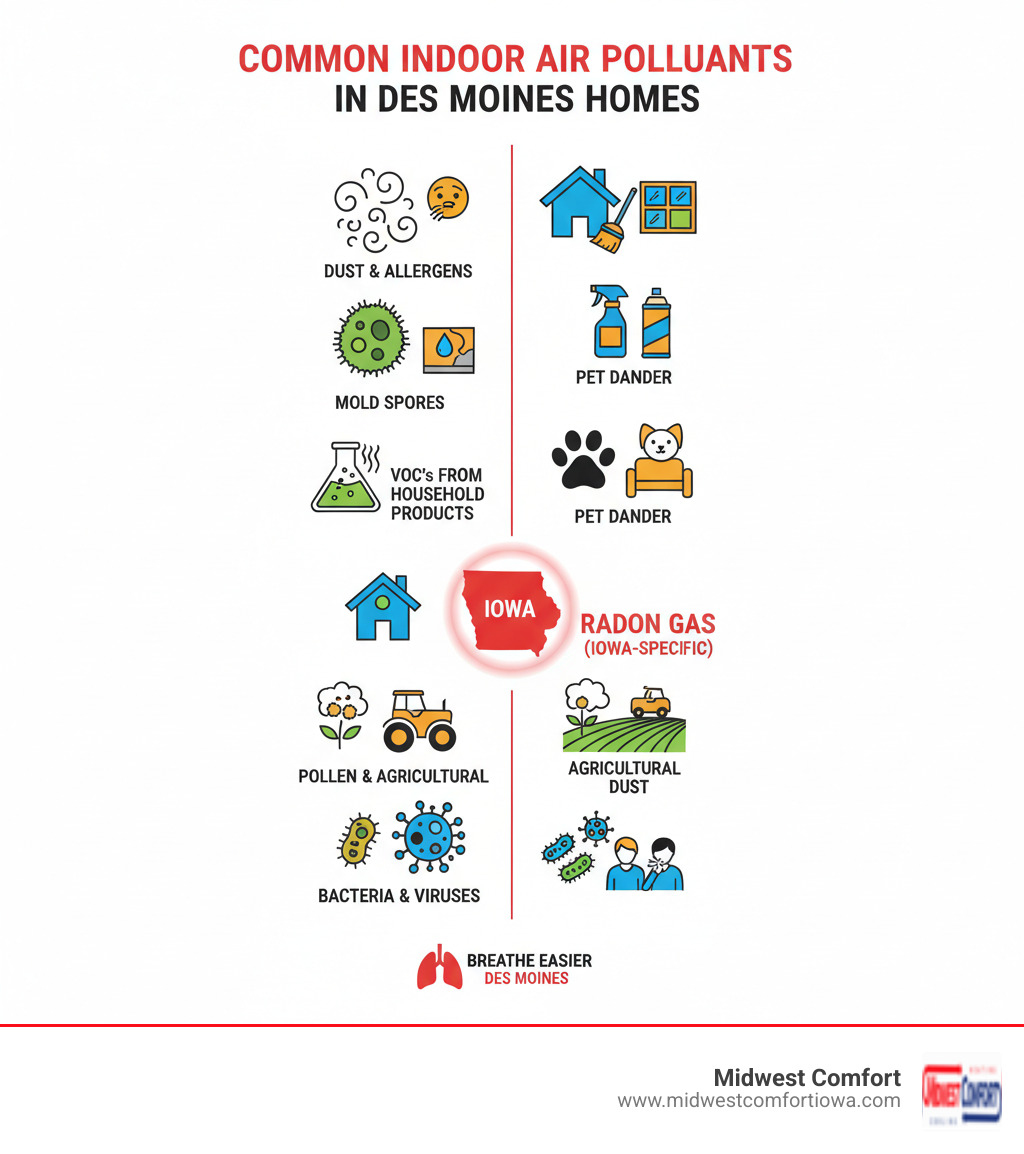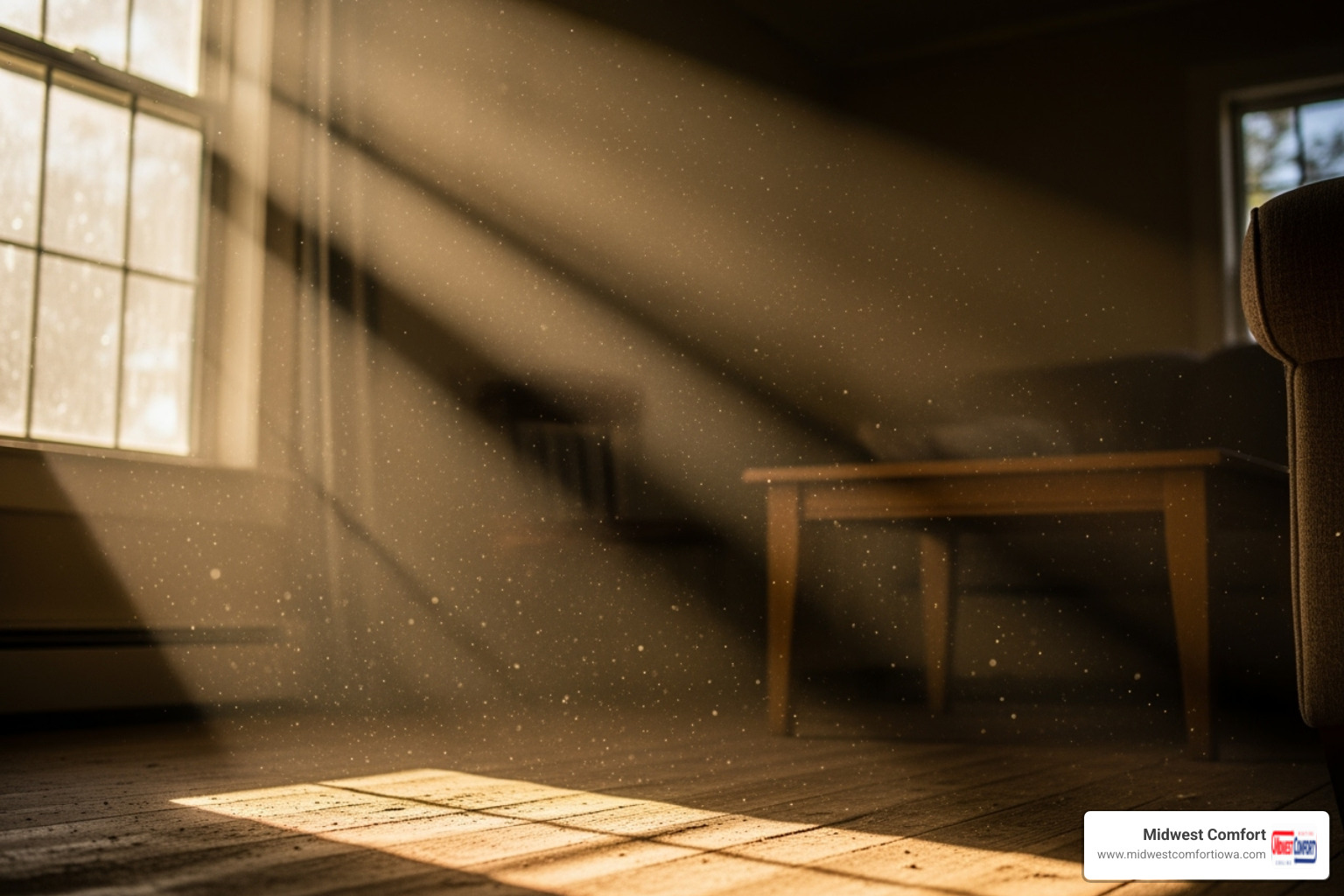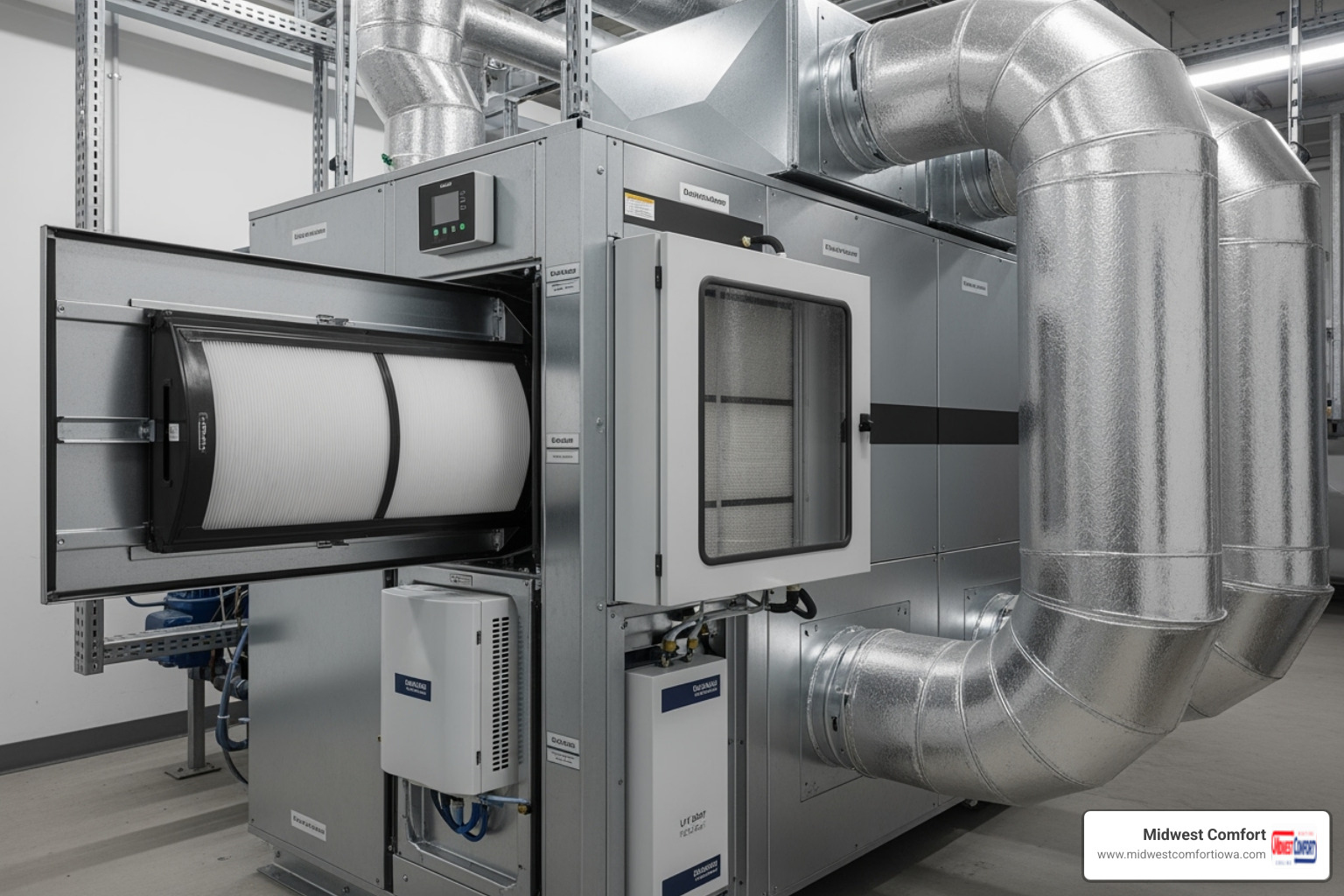Decoding Des Moines' Air: A Comprehensive Guide to Indoor Air Quality Systems


Discover the Essential Benefits of Regular Air Conditioning Maintenance
Regular maintenance of your air conditioning system ensures optimal performance and longevity. It helps prevent costly repairs while improving energy efficiency, keeping your home comfortable year-round.

Routine checks can significantly reduce energy bills and extend the life of your unit.


Why Your Home's Air Matters More Than You Think
Indoor air quality Des Moines homes face unique challenges that many residents don't realize until health issues arise. The EPA has found that indoor air can be 2-5 times more polluted than outdoor air, and in some cases, up to 100 times worse. Considering most people spend 90% of their time indoors, the air circulating through your home directly impacts your family's health. Poor indoor air quality can trigger asthma, worsen allergies, cause headaches, and lead to long-term respiratory issues, especially during Iowa's harsh winters when homes are sealed tight.
Quick Answer: Indoor Air Quality in Des Moines
Common Pollutants:
- Dust, pet dander, and pollen
- Mold spores and mildew
- Volatile Organic Compounds (VOCs) from cleaners and furnishings
- Radon gas (Iowa is a high-risk state)
- Agricultural dust from surrounding farmland
Top Solutions:
- Regular HVAC maintenance - Annual check-ups and filter changes
- Air filtration systems - HEPA filters and high MERV-rated options
- Air purifiers - Whole-home systems that neutralize pollutants
- Humidity control - Maintain 30-50% humidity year-round
- Duct cleaning - Remove accumulated contaminants every 3-5 years
Health Impacts: Poor indoor air quality can trigger allergies, worsen asthma, cause headaches and fatigue, and lead to long-term respiratory issues.
This guide breaks down everything Des Moines homeowners need to know about indoor air quality. You'll learn how to identify problems, understand the difference between filtration and purification, and find practical solutions that fit your family's needs and budget. Whether you're dealing with constant dust, seasonal allergies, or simply want your family to breathe easier, this guide will help you take control of your home's air.

The Unseen Threats: Identifying Poor Indoor Air Quality in Des Moines
Even in a clean house, invisible contaminants can affect your family's health daily. The dust particles you see dancing in a sunbeam are just a fraction of what's floating through your home's air.

Primary Sources of Indoor Air Pollution
Most pollution affecting indoor air quality Des Moines residents face originates inside the home.
- Volatile Organic Compounds (VOCs): These gases are released from everyday items like cleaning products, fresh paint, new furniture, air fresheners, and craft supplies.
- Biological Pollutants: This category includes pet dander, dust mites in bedding and carpets, and pollen that hitches a ride indoors on clothes and shoes.
- Mold and Mildew: These fungi thrive in damp areas like bathrooms, basements, or inside HVAC systems where condensation collects, releasing spores into the air.
- Radon Gas: Iowa is a high-risk state for this colorless, odorless radioactive gas that seeps up from the soil. It is the leading cause of lung cancer among non-smokers and can only be detected through professional testing.
- Combustion and Activities: Cooking, burning candles, and even opening windows during high pollen days or agricultural spraying can introduce contaminants. The EPA's Introduction to Indoor Air Quality provides more detail on these sources.
Health and Wellness Impacts
Poor air quality often causes gradual, persistent symptoms. Immediate effects can include itchy eyes, a scratchy throat, frequent headaches, dizziness, or unusual fatigue. For those with allergies or asthma, it can mean more frequent and severe flare-ups, often worsening upon returning home.
Long-term exposure is more serious, contributing to chronic respiratory diseases, heart disease, and even certain types of cancer. Your home should be a safe haven, not a source of health problems.
Common Signs of Low IAQ in Your Property
Your home provides clues when its air quality is poor. Be aware of these common signs:
- Excessive Dust: If you're constantly wiping down surfaces only to see dust reappear quickly, your filtration may be inadequate.
- Persistent Odors: Lingering cooking smells or a general staleness indicate poor ventilation and a buildup of airborne particles.
- Uneven Temperatures: Hot and cold spots suggest your HVAC system isn't distributing air effectively, which also means it isn't filtering pollutants properly.
- High Humidity: A damp or muggy feeling, especially in summer, creates ideal conditions for mold. Look for condensation on windows or pipes.
- Visible Mold Growth: Fuzzy patches in bathrooms, basements, or around windows are a clear sign of a problem.
- Worsening Symptoms Indoors: If allergy symptoms or frequent illnesses improve when you leave the house, your indoor environment is likely the culprit.
A Breath of Fresh Air: Top Solutions for Improving Your Home's Air
Once you know what's in your air, you can take practical steps to improve it. A comprehensive approach that combines several solutions is the most effective way to create a healthy indoor environment for your family.

The Foundation: HVAC Maintenance and Duct Cleaning
Your HVAC system is your home's respiratory system. When neglected, it can spread pollutants and worsen your indoor air quality Des Moines home. The simplest step is regular filter changes. A clogged filter can't trap dust, pet hair, and pollen, forcing your system to work harder and reducing airflow. Check your filter monthly and change it every 1-3 months.
Beyond filters, annual professional check-ups are crucial. Technicians clean coils, check airflow, and ensure all components are working. Dirty coils can harbor mold and bacteria that get blown into your home.
Your ductwork also accumulates dust, dander, and mold over time. Professional duct cleaning removes this buildup, giving your system a fresh start. Most homes benefit from this service every 3-5 years. Learn more at Air Duct Cleaning Des Moines.
Air Filtration vs. Air Purification: What's Best for Des Moines Homes?
Air filtration and air purification sound similar but work differently. Understanding the distinction helps you choose the right solution.
Air filtration uses a physical barrier to trap particles. The effectiveness is measured by its MERV rating; a higher rating captures smaller particles. HEPA filters are the gold standard, capturing 99.97% of particles like dust, pollen, mold, and bacteria. However, they don't eliminate odors or gases.
Air purification actively neutralizes or destroys pollutants. UV light systems kill viruses, bacteria, and mold spores, while ionization technology causes pollutants to clump together, making them easier to filter or causing them to fall out of the air. Advanced systems can also break down VOCs and odors.
| Feature | Air Filtration | Air Purification |
|---|---|---|
| Primary Function | Captures and physically removes particles from the air | Neutralizes or destroys airborne pollutants |
| Pollutant Type | Dust, pollen, pet dander, mold spores, larger bacteria | Viruses, odors, VOCs, smoke, tiny bacteria, chemical fumes |
| Mechanism | Uses physical filters (fibrous media) to trap particles | Uses various technologies: UV light, ionization, activated carbon |
| Effectiveness | Measured by MERV rating for particle capture | Measured by ability to reduce specific contaminants and odors |
| Maintenance | Regular filter replacement | Bulb replacement (UV), cell cleaning (ionizers) |
For most Des Moines families, a combination of high-quality filtration and purification is best. Explore options at Air Filters Des Moines, IA and Air Purifiers Des Moines, IA.
Controlling Humidity and Ventilation for Optimal Comfort
Humidity is as important as temperature for your health. The ideal indoor range is 30-50%. Balanced humidity prevents mold growth (which thrives above 60%) and protects your respiratory system from irritation caused by overly dry air. It can also help lower utility bills.
Des Moines' climate requires year-round humidity management. In our dry winters, a whole-home humidifier adds necessary moisture. Learn more at Whole House Humidifier. In humid summers, a dehumidifier removes excess moisture to prevent clamminess and mold.
Proper ventilation is also key. Modern, tightly sealed homes can trap pollutants. Energy Recovery Ventilators (ERVs) solve this by exchanging stale indoor air for fresh outdoor air while transferring heat and moisture to save energy. This provides fresh air without wasting the energy used to heat or cool your home. For more on ventilation, visit Optimize Your Home's Ventilation System.
How Iowa's Seasons Impact Your Indoor Air Quality
Living in Des Moines means experiencing four distinct seasons, each presenting unique challenges for your indoor air quality Des Moines home. Understanding these seasonal shifts allows you to be proactive in maintaining a healthy environment.

Winter: Sealed Homes and Stale Air
When we seal our homes to keep out the winter cold, we also trap pollutants inside. With limited fresh air, contaminants like dust, pet dander, VOCs, and viruses build up and recirculate. The increased time spent indoors also leads to more dust and dander accumulation. Furthermore, heating systems strip moisture from the air, causing dry skin, scratchy throats, and increased susceptibility to colds. A whole-home humidifier is an effective solution for winter dryness. For guidance, see our Des Moines Humidifier Installation Guide. Finally, ensure you have working carbon monoxide alarms, as reliance on furnaces and fireplaces increases CO risk.
Spring & Fall: Allergens and Agricultural Dust
These transitional seasons are peak time for allergens. Spring brings tree and grass pollen, while fall is dominated by ragweed. Opening windows to enjoy the mild weather invites these allergens inside. Iowa's agricultural landscape adds another challenge, as planting and harvesting stir up dust that can travel for miles and infiltrate homes. This makes high-quality air filtration and purification systems especially valuable, allowing for ventilation while capturing airborne particles. The EPA offers recommendations for improving indoor air quality that are particularly useful during these seasons.
Summer: Humidity, Mold, and Mildew
Des Moines summers are known for high humidity, which creates serious indoor air quality issues. When indoor humidity rises above 50-60%, it creates a breeding ground for mold and mildew in basements, bathrooms, and other damp areas. These fungi release spores that can trigger allergies and asthma. While your air conditioner removes some moisture, it may not be enough during peak humidity. A whole-home dehumidifier can maintain optimal humidity levels. The constant A/C use also puts extra strain on your filters, making regular changes even more critical to ensure proper airflow and filtration.
Beyond the Home: IAQ for Des Moines Businesses
When we discuss indoor air quality Des Moines, we often focus on homes. However, the air in commercial buildings—offices, shops, and restaurants—is just as critical. The quality of that air affects employee productivity, customer comfort, and the overall success of a business.
Key Benefits of Commercial Air Purification
Investing in commercial air purification offers significant returns for Des Moines businesses. The primary benefits include:
- Improved Health and Productivity: Clean air reduces the spread of airborne viruses and bacteria, leading to fewer sick days and a more productive workforce.
- Improved Customer Experience: A fresh, clean-smelling environment makes customers feel more comfortable and encourages them to stay longer, which can directly impact sales.
- Effective Odor Elimination: Purification systems neutralize persistent odors from cooking, chemicals, or old building materials, creating a more pleasant atmosphere.
- Protection of Sensitive Equipment: Reducing airborne dust and particles helps protect computers, servers, and other electronics from overheating and premature failure.
- Higher Employee Morale: Investing in a healthy work environment shows employees you care about their well-being, which can improve job satisfaction and retention.
Navigating Regulations for indoor air quality in Des Moines
The regulatory landscape for commercial IAQ can be complex. Different industries must adhere to different standards to protect employees and customers.
- The Occupational Safety and Health Administration (OSHA) sets general workplace safety standards that include provisions for adequate ventilation and protection from airborne contaminants.
- The American Society of Heating, Refrigerating and Air-Conditioning Engineers (ASHRAE) provides industry best practices for ventilation rates and contaminant levels, which are closely followed in sectors like healthcare.
- Many businesses face industry-specific requirements. For example, food service establishments must comply with state health department rules for ventilation to ensure sanitation and prevent foodborne illnesses.
Navigating these standards can be challenging. At Midwest Comfort, we help Des Moines businesses assess their needs, understand applicable regulations, and implement commercial air purification systems that ensure compliance and create healthier spaces for employees and customers alike.
Your Next Steps to Breathing Cleaner Air
You've learned about the invisible threats in Des Moines homes and the solutions that can dramatically improve your indoor air quality Des Moines. The path to healthier air is a practical one, built on a few key strategies.
The foundation is regular HVAC maintenance, including filter changes and annual check-ups. This can be improved with professional duct cleaning to remove accumulated contaminants. Combining effective air filtration (like HEPA filters) with air purification (like UV light) creates a powerful defense against pollutants. Finally, managing humidity with whole-home humidifiers and dehumidifiers and ensuring fresh air with ventilation systems completes the picture.
While this guide provides a strong starting point, every home is unique. You may have specific challenges, from a damp basement to severe seasonal allergies. A professional assessment is the best way to identify exactly what's affecting your air and determine the most effective solution.
At Midwest Comfort, we're a family-owned business that treats your family like our own. We listen to your concerns and recommend custom solutions that fit your specific needs and budget—no upselling, just honest advice. The benefits are significant: fewer illnesses, better sleep, reduced allergy symptoms, and the peace of mind that comes with a healthy home. For businesses, it means healthier employees and happier customers.
You've already taken the first step by educating yourself. Now, it's time to take action. Fresh, clean air isn't a luxury—it's something every Des Moines family deserves.
Ready to breathe easier? Contact us for your IAQ needs and let's start your journey to healthier indoor air today.















